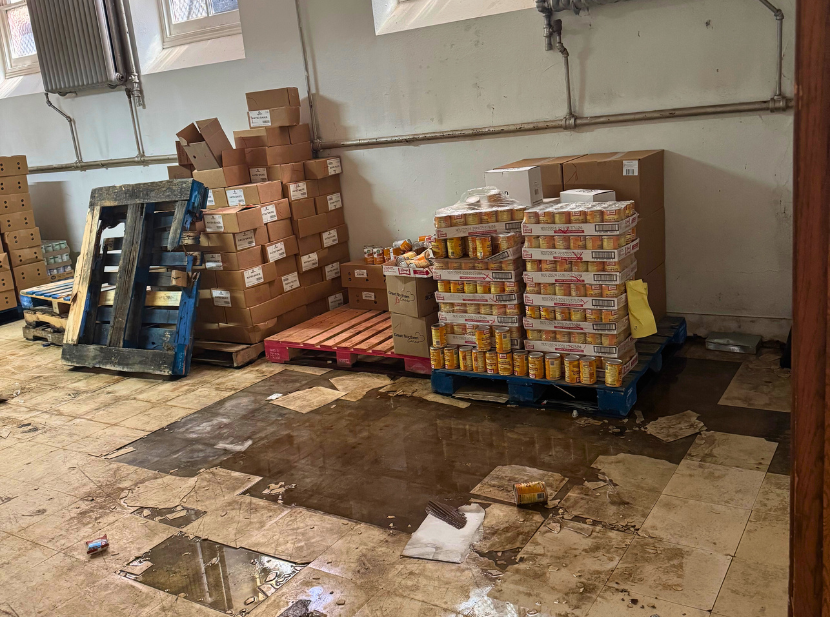August Flooding Disrupts Food Pantries During Already High Demand
October 24, 2025

This article was by written by journalists at USA TODAY NETWORK-Wisconsin newspapers and reposted to this website for informative purposes only.
The building at 1228 W. Bruce St. held a lot of promise for Ebenezer Stone Ministries.
The 18,000-square-foot building in Milwaukee’s Menomonee Valley allowed the ministry to become a food distribution center for Feeding America Eastern Wisconsin. It also allowed the faith-based organization to offer more social programs to help area residents.
The August rains that soaked much of the Milwaukee area changed that. The pantry and distribution site must move from the building it has called home for the last two years.
They couldn’t risk another flood.
“When we moved into the building, it obviously was a great moment,” said Michael Haas, Ebenezer Stone Ministries’ executive director and vice president of the board of directors. “But the landlord company knew there was a potential for flooding and didn’t disclose it to us.”
The foot of water the warehouse got caused extensive damage. The distribution center had to discard $20,000 in food. Several pieces of equipment were damaged, including a forklift the organization used for a job skills training program for justice-involved citizens. And several of its coolers and freezers were also damaged.
Altogether, Haas said they lost between $150,000 and $180,000.
“It set us back financially,” said Haas, who is looking forward to moving into the ministries’ new West Milwaukee facility, which is not in a flood plain.
Ebenezer Stone Ministries is not the only pantry in Feeding America Eastern Wisconsin’s network to have lost food and equipment due to the August floods. More than 20 pantries experienced flooding or serve communities significantly impacted by flooding.
Feeding America Eastern Wisconsin reported these pantries lost $1.2 million in equipment, food products, and in flood damage to their facilities. Additionally, an estimated 30,000 pounds of food had to be discarded, worth approximately $50,520.
While some were able to reopen within days with minimal disruption to services or at a reduced capacity, full recovery for some pantries is still a long way off.
“Most of these pantries were able to find ways to band together and get up and running nearly immediately after the floods,” said Matt Stienstra, Feeding America Eastern Wisconsin’s Director of Advocacy and Community Engagement.
“But their ability to provide full service in the way they did before is still something that most of these pantries are dealing with,” he added.
Haas was determined to have the distribution center back up and running. It was shut down for two weeks — a hard pill to swallow for a site that services 42,000 people a month among 41 pantries all the way down to the Illinois border.
“Our farthest pantry came from Beloit,” Haas said. “I was adamant that we can only be shut down for a minimum of time. We had to start feeding people.”
Feeding America Eastern Wisconsin worked with affected pantries like Ebenezer Stone to put together a support plan to ensure pantries are able to serve their neighbors in some capacity.
Many pantries had to pivot to meet demand, especially for those who suffered spoilage from power outages or water-damaged freezers. Haas said he was thankful the community stepped in. The community, he said, provided food and financial donations, which helped buy milk and eggs.
“We still have those needs,” Haas said.
Emergency food boxes help bridge the gap
Feeding America Eastern Wisconsin also stepped in to help fill the gap. The organization provided emergency food boxes. The boxes contained shelf-stable food such as peanut butter, granola bars, and meals-ready-to-eat for pantries that lost refrigeration or coolers. The nonprofit also provided other necessities like disposable cutlery or dishware.
In all, Feeding America Eastern Wisconsin distributed over a five-week period:
- 46 pallets / 1,656 emergency relief boxes
- 37 pallets / 78,745 pounds of bottled water
- 2 pallets of peanut butter
Greater Mount Sinai Church of God in Christ, located on the city’s far north side, received approximately 300 emergency food boxes. Damage to their building forced them to distribute the boxes outside in the parking lot. The boxes were gone within 45 minutes, the few days the pantry was able to distribute, says Evangelist Denise Holmes, president of the church’s pantry.
“The need for food was so bad,” she said. “We used everything we had in our pantry. Our freezer is empty now.”
The pantry is still not fully operational. Water from a creek that ran alongside the church’s two-story building overflowed and poured into the first-floor sanctuary. The second-floor pantry was untouched, but the water destroyed the building’s only elevator. Without a working elevator, Holmes said, it’s hard for the church’s elderly volunteer staff to serve the community fully.
Thanksgiving donations are sought for 100 families served
Holmes said she is concerned about the holidays. She said Feeding America Eastern Wisconsin may not be able to provide enough turkeys for the more than 100 families the pantry serves. Holmes said they are seeking food donations in addition to what Feeding America Eastern Wisconsin provides.
“We have Thanksgiving coming up. We are trying to give good holiday baskets,” Holmes said.
Helping pantries like Greater Mount Sinai, which Stienstra said is in an area that’s a food desert and has no additional food pantries, is important.
“There is still a lot of food insecurity,” he said.
Stienstra was moved by the pantries’ commitment to their community regardless of their own circumstances. Many are volunteer run, but people stepped up to help or provide support. That’s when these pantries’ mission really shines, he said.
“Talking to our food pantries in the days after, was both heartbreaking and heartwarming at the same time,” he said. “Finding ways to band together is reminiscent of what happened during COVID.”
The organization itself didn’t escape the ravages of the August rain. The roof leaked, but it didn’t impact any food. Stienstra said crews cleaned the facility the next day and were available if any concerns arose.
“We never lost a single hour of being able to serve,” Stienstra said.
But the need persists. Pantries, he added, are seeing an increasing need for assistance. People face food insecurity due to cuts in benefit programs and rising grocery prices long before the August rains and will linger long after.
And a recent study found 30% of families who access food pantries have incomes that don’t qualify for federal benefits, but are still food insecure.
“Yes, the water has receded, but the need hasn’t,” Stienstra said.
